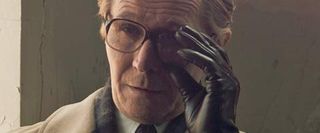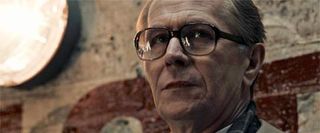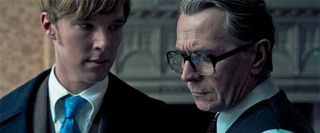Gary Oldman Talks Trusting The Director And The End Of The Batman Trilogy

The relationship between an actor and a director is a complicated one. Obviously every actor has their own special skills, preparation methods and approaches to character, but the director is in charge of the whole show – it’s their job to make sure everything comes together both in the story and visually. It’s only natural that this dynamic will cause conflict, but for Gary Oldman the name of the game is trust.
Earlier this week I had the chance to participate in a roundtable interview with Oldman to discuss not only his newest film, Tinker, Tailor, Solider Spy (which comes out today), but also his approach to projects and his work on the upcoming Batman sequel, Christopher Nolan’s The Dark Knight Rises. Check it out!
Is this prime material for actors, since everything is so subtle and what you're saying oftentimes is in your face?
I just think it's probably good material. If you break a sweat, you're working too hard. This is not only a good script, but it's also supported by the book and the paring down of this piece. Obviously we had to throw a lot of pages out. Tomas [Alfredson] has condensed something into a composition -- four lines and a look, but you feel that you've got the support, the subtext. You bring the book with you every day. It's rare.
What makes it effortless that you don't have to break a sweat?
A script is like your emotional map of the world, and often, with bad writing, you're being asked to make jumps and leaps. Lines don't flow. There's inconsistency in it and you're making it work. You're working very hard to make it work, and when you get something that flows, it's like working on [Arthur] Miller or [David] Mamet. You know that you're supported by it. You're not fighting it. It takes you.
Is there an extra degree of difficulty in a project like this, where so much is about the atmosphere and tension that's being built by the director and in the editing later on? How do you factor that into your performance?
CINEMABLEND NEWSLETTER
Your Daily Blend of Entertainment News
You just trust them. You have to. I mean, there was some work I noticed that he had done from things that had changed slightly from the script to the edit -- what they shuffled around and moved around in the edit. But a great deal of it was in the script and in Tomas [Alfredson]'s head. What I saw on the screen was pretty much how he discussed it and walked you through it. There wasn't hours of footage and all the other stuff in the wings that he shot and then cut. He's very decisive. I'll give you an example. Toward the end of the film, when I'm in that house and we're all zeroing in on the mole, there's that sequence where I take the mint and I listen to them arriving. There is no other footage that he shot, of feet and hands and briefcases and cars pulling up. I said, "Well aren't you going to shoot some other stuff there?" He said, "No. I'm just going to shoot it on you and I'll put the sound FX on there of them arriving." I said, "Yeah, but you'll cutaway to something." He said, "No. I'll play it on you." You're only there the once. This is an indie. This is not a movie that you go away and then you cut it and then you put it together, and then the studio will give you another $20 million, another $10 million to go back and do re-shoots and things. And then you think, "God. I was there. I wish that I had that material." So you have to really trust someone like Tomas, that the atmosphere and all of that will be there.

Is that trust given, or is it earned, would you say?
You spend so much of a career...you have to give it to people. You have to give it, whether they've earned it or not, because that's the nature of the work. And often the same amount of work and commitment goes into making a bad movie. It's just the same people working, the same cameramen and crew. Sometimes it works and sometimes it doesn't.
What was most intriguing about George Smiley to you when you were considering playing the role? What hooked you?
I knew who the character was. I'm old enough to have seen the series. He's like an owl, George. He's got those big eyes behind those specs. He sees everything and hears everything. It's nice to play a character like that. It's nice to be the smartest man in the room. Often I play characters that think they're smart, but they're not very smart. He's so poker-faced. He's just like a sleeping volcano. He's there, but it's all underneath.
Would you like to play him again if there's another film made?
I think they're seriously now talking about it.
Do you know which novel it would be?
Smiley's People. It would probably be a slight cross pollination of The Honorable Schoolboy, but I think it would be Smiley's People.
Would Tomas direct again?
Yeah, same people, same team. Sadly, Bridget O'Connor won't be with us, but yeah. I kind of miss George. I liked him. He was very good for my blood pressure.
Are there other characters that you've played that you miss and wish you could revisit?
When you go into work in the morning, and you know that you've got a big emotional scene and it could be physical or a fight that you have, or it could just be you, you get to work and think, "I've got to climb that mountain a bit today." You never know if it's going to be there. You're going to call on it and think, "Can I find the range? Can I find the tiers? Can I find what I need to make the scene work?" There are days that it comes easier than others, but what was nice about George is that I knew when I got there that I wouldn't be doing any of that. I would just be sitting in a chair and I would listen. I love playing Drexel, but it was a four-day shoot or whatever. I've played so many of those. I remember doing The Dark Knight and looking at what Heath (Ledger) was doing. It was dazzling. You could tell very early on just how marvelous he was being, and I remember thinking, "Rather you than me." I was quite happy to be playing Jim Gordon. Maybe it's age. Maybe you just start to get a little older.

And you've reprised that role recently. How has it been to go back and do that?
It was lovely. I've been extremely lucky because I was not only in Harry Potter in a role that I reprised, but also Jim Gordon. To get one franchise is lucky. To get two is kind of greedy, isn't it? My fellow actors are like, "And he's in Batman. God, I hate him." I'll tell you what it's like. You don't see family. You're busy. You're on the road and you're doing what you're doing, watching all of those movies, and I'm busy making them. And then at Thanksgiving or Christmas, that's when most people all reconnect, and that's a little what it's like. It's kind of like that. You don't see people for a couple of years, three years, and then you go back on the set and there's Chris [Nolan] and there's Emma [Thomas] and there's Wally Pfister and there's Christian [Bale] and all the gang. Some new faces, but it feels like family, like all of a sudden you're getting back together. Both experiences have been good. If you weren't having a good time, then going back could be hell, I guess.
Does it feel like an ending, doing the last entry of this incarnation of Batman?
For us, I think it's the end. They don't have Potter anymore. So there could be a Batman 4 and 5. It may be Chris overseeing it in a producerial position, but for us and for Chris, I think that's it. It's a great way to go out, though. It's a great story. Epic, epic thing it is.
That's the important thing -- that it's really about the story...
I think Chris strikes me as someone who's too smart and too classy to just make a third for the sake of making it. I don't think that's who he is. I remember way back saying to him, "Is there going to be a third?" He said, 'If I can get the story right. I've got to out-do myself. I've got to do it better than The Dark Knight. I've just got to get it right."
And the bar is raised really high too.
He set the bar very high, so he said, "If I can find a story that interests me, I will do it." I think also that it's genius that he's picked Bane as the villain -- that he didn't go with The Riddler or The Penguin. I think right there is a wise choice.
What mark do you think you left on the character of Jim Gordon?
I have to go back to that Rolling Stone review. Peter Travers said that I'd made virtue look exciting, which you don't get many of. Once in a while, you get one of those. That's all he said, but it was enough. He's like George in that respect. It's moral certainty. George doesn't work... With Smiley, there's no narcissism. It's for queen and country. He's of that old school. Someone like Smiley and Prideaux are peas in the same pod, really. Smiley is just giving him a little tickle when he says, "You knew all of that, but you went. Why did you go?" Jim Prideaux says, "It's called doing one's duty." I think, if there's any remote connection between Smiley and Gordon, it's that. It's nice to come in and be the moral colonel, in a way.

Eric Eisenberg is the Assistant Managing Editor at CinemaBlend. After graduating Boston University and earning a bachelor’s degree in journalism, he took a part-time job as a staff writer for CinemaBlend, and after six months was offered the opportunity to move to Los Angeles and take on a newly created West Coast Editor position. Over a decade later, he's continuing to advance his interests and expertise. In addition to conducting filmmaker interviews and contributing to the news and feature content of the site, Eric also oversees the Movie Reviews section, writes the the weekend box office report (published Sundays), and is the site's resident Stephen King expert. He has two King-related columns.
Most Popular






